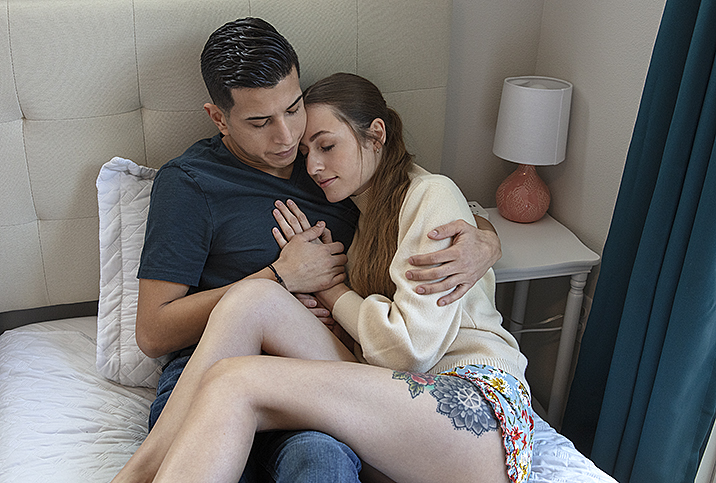How Good Pals Can Have Great Sex While Remaining Friends with Benefits

Maintaining a friends with benefits (FWB) relationship is one of the great minefields of the dating spectrum. Think of it as performing a juggling act with one arm behind your back or tiptoeing across a swaying, trembling tightrope in bare feet.
Now, if those circus-themed metaphors are coming across as a bit heavy-handed, it's because maintaining an FWB relationship for an extended period of time—keeping the sexual spark alive while ensuring your friendship stays strong, all without any emotional "strings attached"—can be as difficult a feat as anything you'd see under a circus tent.
Unplanned but fun FWB
Isabella, a 28-year-old from Ottawa who requested her last name not be used, fell into an FWB relationship naturally after she and her partner had already tried to date for a few months.
"We dated, [the spark] just wasn't there, and we ended up calling it quits after a few months," she said. "We just weren't compatible in a romantic way."
Until…a few months later, they ran into each other and went for a drink.
"We ended up sleeping together and then it just kind of…fell into place," she explained.
Isabella said they remained FWBs for about two and a half years.
Maintaining is the tricky piece of the puzzle
It's relatively easy to slip into an FWB situation, but maintaining the arrangement can prove difficult. For instance, what if one of you develops strong feelings for the other or becomes jealous when the other one starts seeing someone else? What if the sex—with all the intimacy and vulnerability that comes with it—erodes an existing friendship, making it impossible to look at each other in the same way?
These are all valid questions and there are plenty more, too. Luckily, though, we spoke to some experts who provided some helpful strategies to help keep your friends with benefits relationship healthy and happy.
How to make friends with benefits relationships last?
The short answer: Communicate, communicate, communicate—and then communicate some more.
"It's a good idea for FWBs to check in with each other from time to time. We can't assume that the ground rules and expectations we shared at the start will stay the same forever," said Rhian Kivits, a sex and relationship therapist based in the United Kingdom.
"FWBs tend to enjoy the lightness and freedom of their relationships, so checking in doesn't have to be heavy," she added. "It's simply about offering each other the space to share with the same positive regard that they'd offer any friend that they value and respect."
Communication was certainly something Isabella prioritized.
"We had a lot of conversations about it as we went. The communication was really good. We'd tried dating, it hadn't worked, we [were] still good friends, we enjoyed hanging out with each other, but we also had really good sex. [And] almost every time we saw each other, we would have that discussion," she said. "I definitely have been in FWB things with other people where I didn't feel respected or I would feel really jealous. We never had that because we were so open."
What to do if one (or both) friends begin seeing or sleeping with someone else?
If either friend in a FWB situation start seeing someone else, the first priority is to talk about sexual health.
"It's important to share that you have multiple FWBs for sexual health reasons," said Lee Phillips, Ed.D., a psychotherapist and certified sex and couples therapist based in New York City. "However, some people may choose not to disclose they have multiple FWBs because they're not involved in a serious relationship. Whether you choose to disclose or not, I would recommend regular STI testing every three months."
Kivits agreed, saying, "It's important that FWBs don't ignore the issue of sexual health."
In addition to regular testing for sexually transmitted infections—and requiring this of regular sexual partners—Kivits advised using condoms.
"These kinds of conversations may feel uncomfortable, but health and well-being must be a priority," she explained.
"We were really, really strict about sexual health stuff," Isabella said. "We always had the discussion that you had to use condoms with other people, you had to get tested regularly. That was really important to us. [And] he was really respectful. A lot of guys, I wouldn't trust with sexual health stuff, but he's time and again proven to be really trustworthy. I felt really safe with him."
How can we keep up the 'friendship' side of the FWB relationship?
"Friendship is the foundation of [an] FWB relationship, so it's important to continue to nurture the friendship by enjoying time together outside the bedroom," Kivits said. "It helps when the focus isn't always sex. If you've always socialized together in a group, continuing to do so without presenting yourselves to your mutual friends as a couple might be important."
Friendship was vital to Isabella's relationship.
"We were friends throughout," she said. "There were times when we would not have sex and we would just hang out instead. And we knew a lot about each other's lives. We were doing it because we enjoyed each other's company—both sexually and in a friend way—[and] it definitely did feel like a friendship."
Ultimately, according to Phillips: "If you have a long history of being friends first, there's a good chance your relationship will survive because you have more to offer each other and the friendship history than just sex."
What should we do if one of us starts to develop feelings?
"It is critical to set boundaries and be clear on your expectations," Phillips said. "If you want something more, other than a sexual relationship, it's important to voice your feelings, but there may be a chance for rejection."
"If one person starts to develop feelings for the other, they'll find themselves harboring different wishes and aspirations for the connection," Kivits elaborated. "They may struggle with jealousy if the FWB arrangement is an open one and start craving more time and attention from the other person. I'd advise that they examine their feelings and talk openly and honestly about them with the other person."
This wasn't a problem for Isabella or her partner. Ultimately, their FWB relationship ended because of a (rare) big fight that she described as "not representative of our relationship," and not because one of them had developed deep feelings.
"We knew that we didn't want anything serious with each other," she said. "I want him to be happy and I didn't feel resentful that he was seeing other people. It was always acknowledged that we were doing it because it made sense for right then."
When it ended, Isabella described feeling a "loss."
"[I was] really quite upset because we had been friends for the last two years, and even though it was tied to sex, it didn't diminish that I cared about him," she said.
Looking for an FWB happy ending
It's worth bearing in mind that while romantic feelings can make an FWB relationship very difficult, platonic feelings of friendship can result in a deep bond, too.
Ultimately, it's possible to maintain an FWB relationship for an extended period of time, but it's only possible if you communicate regularly from the outset. Isabella is now back in touch with her former friend with benefits and doesn't know what's going to happen.
"I am going to be seeing him [in early 2023], so who knows?" she said. "I do trust him and I do love him as a person. He's a good guy."
Trust, boundaries and STI testing are the keys to a perfect FWB relationship. So get ready to have some open conversations and, if it's what you want, reap the rewards of combining a strong, healthy friendship with some pretty great sex.


















